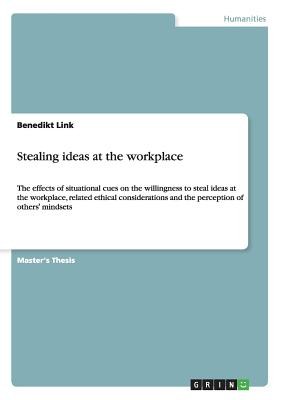
- We will send in 10–14 business days.
- Author: Benedikt Link
- Publisher: GRIN Verlag
- Year: 2015
- Pages: 60
- ISBN-10: 3656443181
- ISBN-13: 9783656443186
- Format: 14.8 x 21 x 0.4 cm, softcover
- Language: English
- SAVE -10% with code: EXTRA
Reviews
Description
Master's Thesis from the year 2011 in the subject Psychology - Work, Business, Organisational and Economic Psychology, grade: 1,0, London School of Economics (The London School of Economics & Political Science), course: Organisationspsychologie, language: English, abstract: This study aims to show that situational cues like semantic primes are able to influence a participantʼs decision-making in the context of taking credit for someone elseʼs idea at the workplace. In a laboratory experiment either a competitive, cooperative or neutral environment was simulated by using subliminal priming techniques. Participants were then exposed to a hypothetical scenario in which they were urged - due to their heavy workload - to take credit for a colleagueʼs idea. In particular, the study examined four constructs: the participantsʼ willingness to take credit for this idea without and with escalating consequences for not choosing to do it, the perceived ethical costs related to that action and the perception of others mindsets. It was expected that participants in the competitive condition would be more willing to take credit for the colleagueʼs idea and perceive less ethical costs than in the neutral condition and vice versa for the participants in the cooperative condition. Additionally, the study expected the participants to perceive the mindset of a random other in the same situation to be similar to their own mindset. Furthermore, qualitative data was collected to explore the decision-making process in such a situation. The results showed that situational cues did not significantly influence the individual decision-making in this particular context. However, several unexpected findings about the relationships between the tested constructs deliver valuable implications for future research on the topic of taking credit for other peopleʼs ideas. In addition, the findings from the qualitative analysis suggest that future studies have to differentiate between ethical and util
EXTRA 10 % discount with code: EXTRA
The promotion ends in 19d.00:38:11
The discount code is valid when purchasing from 10 €. Discounts do not stack.
- Author: Benedikt Link
- Publisher: GRIN Verlag
- Year: 2015
- Pages: 60
- ISBN-10: 3656443181
- ISBN-13: 9783656443186
- Format: 14.8 x 21 x 0.4 cm, softcover
- Language: English English
Master's Thesis from the year 2011 in the subject Psychology - Work, Business, Organisational and Economic Psychology, grade: 1,0, London School of Economics (The London School of Economics & Political Science), course: Organisationspsychologie, language: English, abstract: This study aims to show that situational cues like semantic primes are able to influence a participantʼs decision-making in the context of taking credit for someone elseʼs idea at the workplace. In a laboratory experiment either a competitive, cooperative or neutral environment was simulated by using subliminal priming techniques. Participants were then exposed to a hypothetical scenario in which they were urged - due to their heavy workload - to take credit for a colleagueʼs idea. In particular, the study examined four constructs: the participantsʼ willingness to take credit for this idea without and with escalating consequences for not choosing to do it, the perceived ethical costs related to that action and the perception of others mindsets. It was expected that participants in the competitive condition would be more willing to take credit for the colleagueʼs idea and perceive less ethical costs than in the neutral condition and vice versa for the participants in the cooperative condition. Additionally, the study expected the participants to perceive the mindset of a random other in the same situation to be similar to their own mindset. Furthermore, qualitative data was collected to explore the decision-making process in such a situation. The results showed that situational cues did not significantly influence the individual decision-making in this particular context. However, several unexpected findings about the relationships between the tested constructs deliver valuable implications for future research on the topic of taking credit for other peopleʼs ideas. In addition, the findings from the qualitative analysis suggest that future studies have to differentiate between ethical and util


Reviews